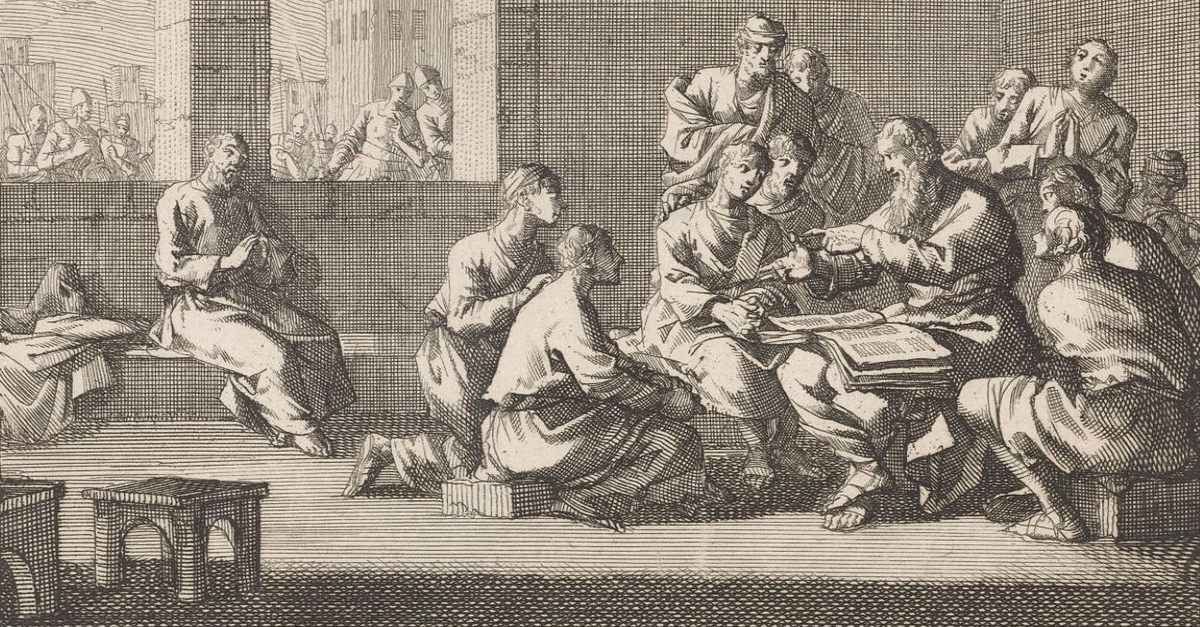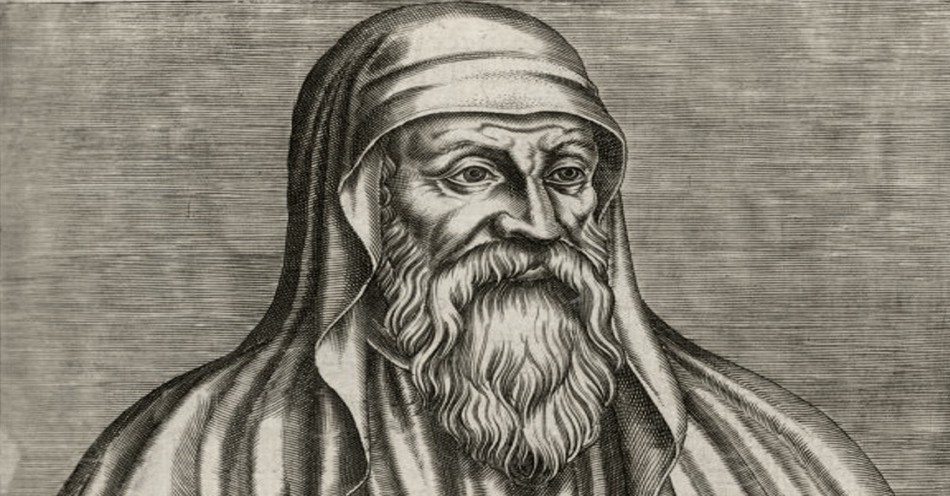Superhero stories dominate entertainment. Whether movies, streaming shows, or graphic novels, the superhero business has boomed over the last twenty years. One of the most famous and classic superheroes is Superman, otherwise known as the “Man of Steel.”
Hundreds of years ago, in the generation after Jesus and the first apostles, a church father lived who was called the “Man of Steel.” The church fathers were leaders and theologians in the second and third centuries that fought off heretics (and sometimes one another), vying for what the essential doctrines of Christianity should be—all while experiencing horrific seasons of persecution from the Roman Empire.
In this fascinating time, these church fathers were concerned with “apostolic doctrine.” Jesus taught the apostles and commissioned them to spread that same message and revelation to others. Some of those apostles wrote the gospels and letters collected in the New Testament. The next generation of leaders had to sift through different ideas to find the nucleus of the faith. Origen was one of the most interesting and extreme of those leaders.
Who was Origen?
Origen was born in 186 AD and grew up in Alexandria. His father, Leonides, was a Christian and taught Origen the scripture and Greek liberal arts. When Origen was a teenager, the Roman Empire beheaded Leonides and Origen was ready to die for his faith, too. Origen’s mother saved him only by hiding his clothes so he couldn’t leave the house and be a martyr.
Origen became a teacher and tutor, a respected profession in Alexandria. Alexandria was second only to Rome in the Empire and boasted a lighthouse (considered one of the ancient world’s seven wonder) and the famous library. Alexandria only gained an orthodox local church around the time Origen was born. The city was full of academics, learning, and philosophy. Origen soon became a leader in the local church, teaching new converts and becoming famous for his intellectualism and writings.
Origen was both an intellectual and a man of action. He gained a reputation for his courage in the face of Roman persecution, placing his life at risk by visiting his students in prison (many of whom were martyred for the faith).
Origen’s growing fame brought him into conflict with the bishop of Alexandria (what we would call the head pastor of the local city church), and he left for Caesarea in Palestine, near the sites of Jesus’ birth and ministry.
Origen was placed in prison during the Christian persecution under Emperor Decius. In prison, he was violently tortured and died of the wounds from that torture a short time later.

Origen with his students, imagined in an 18th-century etching by Jan Luykens. Photo Credit: Wikimedia Commons/Europeana
10 Important Quotes by Origen
1. “One who prays ceaselessly is one who combines prayer with work and work with prayer.”
2. “He makes Himself known to those who, after doing all that their powers will allow, confess that they need help from Him.”
3. “Christ reigns in order to save.”
4. “I do not deny in the least that the rational nature will always keep its free will, but I declare that the power and effectiveness of Christ’s cross and of his death, which he took upon himself toward the end of the aeons, are so great as to be enough to set right and save, not only the present and the future aeon, but also all the past ones, and not only this order of us humans, but also the heavenly orders and powers.”
5. “For whatever be the knowledge which we are able to obtain of God, either by perception or reflection, we must of necessity believe that He is by many degrees far better than what we perceive Him to be.”
6. “What good does it do me if Christ was born in Bethlehem once if he is not born again in my heart through faith?”
7. “The human heart is no small thing, for it can embrace so much.
8. “What each man honors before all else, what before all things he admires and loves, this for him is God.”
9. “The discussion of prayer is so great that it requires the Father to reveal it, His firstborn Word to teach it, and the Spirit to enable us to think and speak rightly of so great a subject.”
10. “It is in our power to stretch out our arms and, by doing good in our actions, to seize life and set it in our soul.”
Ten Things You Need to Know About Origen
1. Origen believed that the Bible was a way to find the mysteries of the heavenly realm through the revelation of the Spirit and Jesus Christ. This is called an allegorical method, finding symbols and references to Christ on every word and page of the Bible.
2. He lived a strict life of extreme self-denial. He didn’t want any distractions from his studies and rejected most or all pleasures of this life.
3. In one of his greatest works, he made a line-by-line comparison of the Greek and Hebrew versions of the Old Testament.
4. Origen memorized vast sections of the Bible.
5. He was so prolific that he required a team of secretaries and copyists to write his thoughts and compile his works for others to read.
6. His most famous book is First Principles, explaining the most important elements of the Christian faith, much like CS Lewis’ Mere Christianity.
7. In an act ironic given his allegorical method, Origen took Matthew 19:12 literally, where Jesus spoke about being eunuchs for heaven and castrated himself. He later regretted this action and admitted he was wrong.
8. The church later condemned a few of his teachings, notably that he believed in a hierarchy among the Trinity (a fairly popular view of the time) and that the resurrection of the dead wasn’t going to be physical.
9. He and Tertullian are the only “Church Fathers” not certified as “saints” by the church.
10. Because of his boldness and how he withstood the horrific tortures of Rome without denying his faith, he was called Adamantius, which in Latin means “Man of Steel.”
Why Is Origen Important Today?
Much of what Origen practiced was influenced by Plato’s philosophical view of life, which dominated the academic culture at the time. Origen was a mystic and sought to know God and heaven as intimately as he could. His allegorical method of interpretation seems odd to many modern evangelicals, but it does have biblical support and value in studying scripture.
Most evangelicals studying the Bible today take the following path: first, we understand the history and context in which the passage or book was written. This includes knowing the author, the culture of the time, and more. Next, we try to take those passages and see how they can be applied to us as individuals or communities. Often, as in narratives in the Old Testament or ceremonies of the law, we don’t apply them and don’t believe we can.
Origen took an extreme position that all of the Bible has eternal treasure within. If the Spirit inspires the whole scripture, then by the Spirit, God can reveal Christ to us in every word or page, every story. Therefore, there are treasures of Christ in every passage.
This isn’t completely unheard of in the Bible. In Galatians, Paul recounts the story of Abraham and his two kids, Ishmael and Isaac (Galatians 3:15-22). The Apostle Paul makes it clear he wasn’t talking about those two boys but the two covenants: the Old and New Covenants, one by human power that leads to slavery and one by the power of God, promise and leading to freedom. Paul doesn’t deny the story took place or its historical importance, but he uses it to teach something more eternal about Christ and the covenants.
The strength of Origen’s method is also its weakness – freedom for anyone to say whatever they want and claim it’s a revelation from the Spirit. Origen recognized this and dealt with it by giving the following restraints. First, the interpretation must be consistent with the Rule of Faith or apostolic doctrine (or what would eventually be known as the Apostles Creed). An interpretation couldn’t conflict with the Rule of Faith.
Second, the interpretation must lead to the person of Christ. Christ is all and in all, and all things point to him. Jesus affirms that idea in John 5:39-40: “You search the scriptures because in them you think you have eternal life. These are the scriptures that testify about me. But you wouldn’t come to me so you would have life.” To be clear, Origen was concerned about the Christ of apostolic doctrine (hence the first rule).
Third, Origen believed that the character of the interpreter mattered. If a person claims to know God, the right doctrine should be revealed in their changed, holy life. God doesn’t talk to people and lead them to sin. The interpreter would also be known by his “fruit” (Matthew 17:16).
Origen was a man of extremes and very complicated. Some of his views were later considered wrong, but we must remember this was a time of discovery when leaders tried to set down basic theology—what was Christian and what wasn’t? What mattered the most in this new faith? As they considered these complex questions, heresies like Gnosticism threatened the church’s growth. Origen’s dedication to holy living is admirable. Still, he took it to an extreme that would make us all uncomfortable: castrating himself based on a wrong interpretation of the words of Jesus.
Yet, when Origen went through the horrible torture of Rome, and they commanded him to deny his faith and Jesus Christ, he wouldn’t. He stayed faithful in his witness to God and the faith, possibly remembering his father’s example at the end. For his steadfast dedication to the Way and the person of Christ in the face of agony, later generations called Origen the “Man of Steel.” Despite how complicated and wrong he was in some ways, that is something to admire.
The time of the church fathers isn’t one we learn in Sunday School, but it has greatly impacted the history of Christianity. Most or all of the church fathers’ writings are available for free online in various forms. Check out Origen's writings here.
And may we all be known as people of steel for Christ in the face of worldly resistance.
Peace.
Photo Credit: Wikimedia Commons/Guillaume Chaudière

This article is part of our People of Christianity catalog that features the stories, meaning, and significance of well-known people from the Bible and history. Here are some of the most popular articles for knowing important figures in Christianity:
How Did the Apostle Paul Die?
Who are the Nicolaitans in Revelation?
Who Was Deborah in the Bible?
Who Was Moses in the Bible?
King Solomon's Story in the Bible
Who Was Lot's Wife in the Bible?
Who Was Jezebel in the Bible?
Who Was the Prodigal Son?





.jpg)